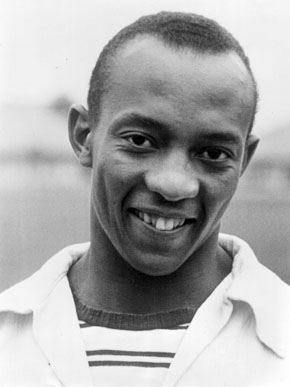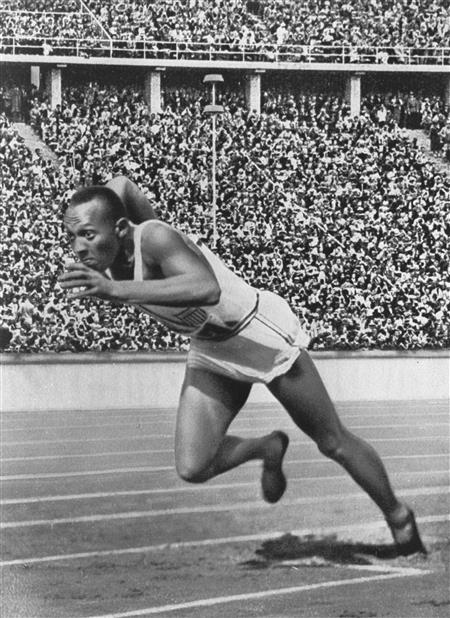 |
| Jesse Owens (http://cdn8.openculture.com/wp-content/uploads/201 ()) |
"We all have dreams. But in order to make dreams come into reality, it takes an awful lot of determination, dedication, self-discipline, and effort." Jesse Owens said that quote, and it perfectly describes his life. Jesse Owens was the son of a sharecropper and grandson of a slave. He was also the seventh child of Henry and Emma Alexander Owens and was named James Cleveland originally. In high school, he was told to go out for track, and ended up becoming the school's top runner. After that, colleges actively tried to recruit him to school, but he felt he couldn't. Despite how he felt, he later went to Ohio State. He broke four world records at Ohio State too. Soon after his record breaking feats, he went to the 1936 Berlin Olympics, standing up for black rights and against Hitler while doing so. Heroes must be hardworking and be courageous, and that is exactly what Jesse Owens is. Because of those traits he possesses, he was able to set world records that were unbeatable for 25 years, win four gold medals at one Olympic event, and stand up for black rights, all in one lifetime.
 |
| Jesse Owens Running (http://www.greatblackheroes.com/wp-content/uploads ()) |
Jesse Owens worked hard throughout his whole life, despite poverty, racism, and other things like sickness. During Jesse's younger years, he wasn't strong enough to help his family tend to the fields they worked in. "From a spindly boy he developed into a strong runner" (Biography: Jesse Owens). During high school, his coach had him try out for the track team, and there he discovered he could run really fast. He broke multiple school records during his time in high school, which led colleges and universities to actively recruit him to their school. Owens thought college was a dream, and that he needed to stay home and work in the fields. Despite feeling that way, he went to Ohio state University, even though the majority of students there were racist. But while at Ohio State, his new running coach Larry Snyder pushed him to work hard to make Jesse the runner he was in his prime. "On May 5, 1935, Owens broke five world records at a meet held at the University of Michigan at Ann Arbor. Many track and field enthusiasts think of May 5, 1935, as the greatest day in track and field history" (Jesse Owens). Owens also helped people in anyway he could after he won the Olympics all throughout the rest of his life. "Throughout his life, he worked with youths, sharing of himself and the little material wealth that he had. In this way, Jesse Owens was equally the champion on the playground of the poorest neighborhoods as he was on the oval of the Olympic games" (About Jesse Owens). Jesse Owens became a motivation speaker after his post-olympic time. He also was the director of the Chicago Boys' club for a time too. Jesse's journey to becoming an Olympian from poverty shows hard work but his dedication towards youth shows that he was truly a hard-working, determined man.
All heroes need to be courageous to be recognized for their heroic feats. And Jesse Owens certainly was courageous. Despite facing poverty and racism even after the Olympics, Jesse went back to help support his family and return back to school to earn his degree. "By 1940, with a wife and three daughters to support (he had married Ruth Solomon in 1935), Owens returned to Ohio State to complete the degree he had abandoned in 1936" (Jesse Owens). If Owens wasn't courageous, he wouldn't have went back to the racist school where he was constantly discriminated. Not a lot of people were willing to go to the Olympics because of Adolf Hitler's presence there, but Jesse went, despite Hitler's hate for both Africans and Jews. He also made Hitler upset that an African American won four Olympics gold medals in track/field. "Owens won in the 100-meter sprint, the 200-meter sprint, the long jump, and the 400-meter relay, collecting a total of four gold medals. In the long jump Owens broke his own record, clearing 26-feet, five-and-three-quarter inches. It would be 25 years before anyone would break his record" (Jesse Owens: Biography.com). Jesse's dedication to his family and his sport shows that not only can people do the impossible but they can do it in the hardest conditions.
Jesse Owens worked hard and always faced life courageously, which is how he became one of the most important Olympic athletes ever. He worked hard, and he became an amazing athlete. He was courageous, and stood up for African-Americans and against Hitler. Owens was an inspiration to many people because of his amazing feats and the awards he won from them. "In 1976, 40 years after his Olympic feat, Owens was invited to the White House to receive the Presidential Medal of Freedom from Gerald Ford. In 1979 he received the Living Legend Award from Jimmy Carter" (Jesse Owens, Notable Black American Men). To earn those awards he had to do something no one else could or would, and he did exactly that. "During a time of deep-rooted segregation, he not only discredited Hitler's master race theory, but also affirmed that individual excellence, rather than race or national origin, distinguishes one man from another" (About Jesse Owens). Jesse Owens was always courageous in anything he did, and was determined to finish anything he could.For some people Jesse Owens was just another Olympic runner, but to others he was an inspiration, legend, and a hero to all.
Works Cited "Jesse Owens." Encyclopedia of World Biography, Gale, 1998. Biography in Context, link.galegroup.com/apps/doc/K1631005006/BIC1?u=powa9245&xid=737e3324. Accessed 12 Jan. 2017. "Jesse Owens." Notable Black American Men, Book II, edited by Jessie Carney Smith, Gale, 1998. Biography in Context, link.galegroup.com/apps/doc/K1622000347/BIC1?u=powa9245&xid=1c757fa3. Accessed 18 Jan. 2017. "About Jesse Owens." Luminary Group, 2017. Web. 19 Jan. 2017. <http://www.jesseowens.com/about/>. Accessed 19. Jan. 2017. Baker, William. "Jesse Owens." Encyclopedia of African-American Culture and History, Gale, 2006. Biography in Context, link.galegroup.com/apps/doc/K3444700969/BIC1?u=powa9245&xid=5c19b388. Accessed 19 Jan. 2017.
Page created on 2/7/2017 12:00:00 AM
Last edited 2/7/2017 12:00:00 AM
